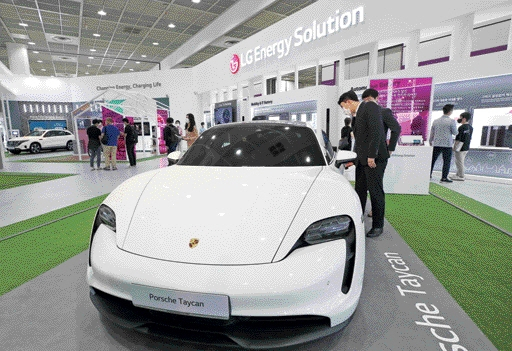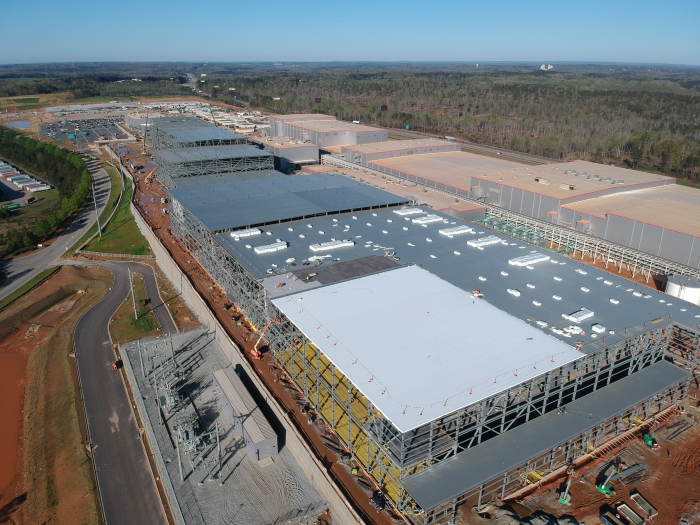EV batteries
Race to produce high-nickel batteries accelerates
BMW and GM scheduled to roll out EVs equipped with high-nickel Korean batteries at end-2021
By Oct 18, 2021 (Gmt+09:00)
4
Min read
Most Read
LG Chem to sell water filter business to Glenwood PE for $692 million


Kyobo Life poised to buy Japan’s SBI Group-owned savings bank


KT&G eyes overseas M&A after rejecting activist fund's offer


StockX in merger talks with Naver’s online reseller Kream


Mirae Asset to be named Korea Post’s core real estate fund operator



Global vehicle makers, including BMW AG and General Motors Co., are scheduled to roll out new EVs equipped with high-nickel batteries made by Samsung SDI and LG Energy, respectively, at the end of this year.
SK On's next-generation battery NCM9, composed of lithium, nickel, cobalt and manganese with 90% nickel content, will be used in Ford Motor Co.'s EV pickup set for launch in the spring of 2022. The new EVs running on Korean batteries will likely shore up the battery manufacturers' bottom lines in the coming years.
A battery cell with a nickel content of more than 80% is classified as a high-nickel battery, offering longer mileage and shorter charging time than existing batteries.
LG Energy Solution and SK On will this year begin the production of high-nickel batteries made of nickel, cobalt, manganese and aluminum (NCMA) and NCM9, respectively, according to industry sources on Oct. 18.
Last month, Samsung SDI kicked off mass production of Gen 5 Li-ion battery cells, a type of nickel, cobalt and aluminum (NCA) battery.
The next-generation batteries increase nickel content to 80-90% of cathodes, one of the four battery materials, along with anodes, separators and electrolytes. Cathodes make up about 40% of a battery cell.
| High-nickel battery | Nickel content | Production plant |
| SK On (NCM9) | 90% | Georgia, US |
| Samsung SDI (Gen 5) | 88% | Hungary |
| LG Energy Solution (NCMA) | 85% | Ochang, South Korea |
SAFETY CONCERNS
However, safety remains an issue as NCM and NCA are prone to catch fire, as was in the case of the NCM622 battery cells used in GM's Chevy Bolt EVs.
This year GM recalled the Chevy Bolt EVs equipped with LG batteries due to fire risk after some of the vehicles caught fire. LG Energy recently agreed to pay $1.9 billion to GM to cover most of the relevant costs.
To improve the safety of high-nickel batteries, SK On completely separates the cathode and the anode inside a battery by placing Z-shaped separators between them. The company will further increase nickel content to 94% for a new battery cell to be unveiled in 2025.
Samsung SDI added aluminum-based materials and special protective coatings to reduce fire risk, and LG Energy also began to use aluminum for batteries to increase safety.
| New EVs equipped with Korean batteries | Battery brand | Rollout schedule | Details |
| BMW SUV iX | Samsung SDI's Gen 5 | End-2021 in S.Korea | 630km mileage on a single charge based on WLTP driving cycle |
| Ford F-150 Lightning pickup | SK On's NCM9 | Spring, 2022 | Pre-orders have topped 120,000 units since May 2021 |
| General Motors' Hummer pickup | LG Energy's NCMA | at end-2021 | -- |
| EVs of Hyundai Motor and Kia | LG Energy's NCMA | H1, 2024 | To be produced in a battery joint venture in Indonesia between Hyundai Motor Group and LG Energy |
LFP BATTERIES
In comparison, Chinese competitors such as Contemporary Amperex Technology Co. (CATL) and BYD have been concentrating on lithium iron phosphate (LFP) batteries, which boast high safety levels at lower prices relative to high-nickel battery cells, though with a shorter battery run time.
Tesla Inc. and Volkswagen this year announced plans to use LFP batteries in their small-size or entry EV models, which some fear could reduce the presence of South Korean battery makers in the EV battery market.
LFP batteries use iron, instead of cobalt and are 20-30% cheaper than NCM batteries. Earlier this month, SK On's Chief Executive Jee Dong-seob told Reuters that the company was considering manufacturing LFP batteries to supply to low- to medium-priced electric vehicles.

LEAD OVER CHINESE RIVALS
Analysts said high-nickel batteries have stronger growth potential than LFPs, which are also facing rising materials costs and are exposed to fire risk.
"Low energy density remains an issue for LFP batteries, which will lead to shorter mileage for EVs," said Samsung Securities analyst Chang Jung-hoon. "As three Korean EV battery makers are going for high-nickel batteries, they will be able to widen their gap with LFP makers."
Further, battery manufacturers and automakers are working on a next-generation EV battery, called an all-solid-state battery (ASSB), to secure longer mileage and shorter charging time than current EV batteries, as well as increased safety.
Write to Il-Gue Kim at Black0419@hankyung.com
Yeonhee Kim edited this article.
More to Read
-
 EV batteriesSK Innovation, Ford to invest $11.4 billion to build largest EV battery JV
EV batteriesSK Innovation, Ford to invest $11.4 billion to build largest EV battery JVSep 28, 2021 (Gmt+09:00)
3 Min read -
 Battery materialsKorean battery SMEs rush for money to expand capacity
Battery materialsKorean battery SMEs rush for money to expand capacityJul 08, 2021 (Gmt+09:00)
2 Min read -
 IPOsSK IE Tech IPO draws record-high demand; brokerage servers down briefly
IPOsSK IE Tech IPO draws record-high demand; brokerage servers down brieflyApr 29, 2021 (Gmt+09:00)
3 Min read -
 Battery stocksMarket jitters grow over Korean battery shares after VW’s decision
Battery stocksMarket jitters grow over Korean battery shares after VW’s decisionMar 18, 2021 (Gmt+09:00)
3 Min read
Comment 0
LOG IN


